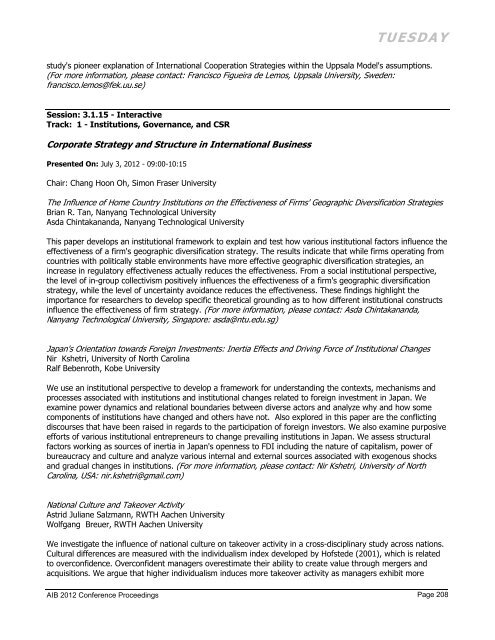AIB 2012 Conference Proceedings - Academy of International ...
AIB 2012 Conference Proceedings - Academy of International ...
AIB 2012 Conference Proceedings - Academy of International ...
You also want an ePaper? Increase the reach of your titles
YUMPU automatically turns print PDFs into web optimized ePapers that Google loves.
TUESDAY<br />
study's pioneer explanation <strong>of</strong> <strong>International</strong> Cooperation Strategies within the Uppsala Model's assumptions.<br />
(For more information, please contact: Francisco Figueira de Lemos, Uppsala University, Sweden:<br />
francisco.lemos@fek.uu.se)<br />
Session: 3.1.15 - Interactive<br />
Track: 1 - Institutions, Governance, and CSR<br />
Corporate Strategy and Structure in <strong>International</strong> Business<br />
Presented On: July 3, <strong>2012</strong> - 09:00-10:15<br />
Chair: Chang Hoon Oh, Simon Fraser University<br />
The Influence <strong>of</strong> Home Country Institutions on the Effectiveness <strong>of</strong> Firms' Geographic Diversification Strategies<br />
Brian R. Tan, Nanyang Technological University<br />
Asda Chintakananda, Nanyang Technological University<br />
This paper develops an institutional framework to explain and test how various institutional factors influence the<br />
effectiveness <strong>of</strong> a firm's geographic diversification strategy. The results indicate that while firms operating from<br />
countries with politically stable environments have more effective geographic diversification strategies, an<br />
increase in regulatory effectiveness actually reduces the effectiveness. From a social institutional perspective,<br />
the level <strong>of</strong> in-group collectivism positively influences the effectiveness <strong>of</strong> a firm's geographic diversification<br />
strategy, while the level <strong>of</strong> uncertainty avoidance reduces the effectiveness. These findings highlight the<br />
importance for researchers to develop specific theoretical grounding as to how different institutional constructs<br />
influence the effectiveness <strong>of</strong> firm strategy. (For more information, please contact: Asda Chintakananda,<br />
Nanyang Technological University, Singapore: asda@ntu.edu.sg)<br />
Japan's Orientation towards Foreign Investments: Inertia Effects and Driving Force <strong>of</strong> Institutional Changes<br />
Nir Kshetri, University <strong>of</strong> North Carolina<br />
Ralf Bebenroth, Kobe University<br />
We use an institutional perspective to develop a framework for understanding the contexts, mechanisms and<br />
processes associated with institutions and institutional changes related to foreign investment in Japan. We<br />
examine power dynamics and relational boundaries between diverse actors and analyze why and how some<br />
components <strong>of</strong> institutions have changed and others have not. Also explored in this paper are the conflicting<br />
discourses that have been raised in regards to the participation <strong>of</strong> foreign investors. We also examine purposive<br />
efforts <strong>of</strong> various institutional entrepreneurs to change prevailing institutions in Japan. We assess structural<br />
factors working as sources <strong>of</strong> inertia in Japan's openness to FDI including the nature <strong>of</strong> capitalism, power <strong>of</strong><br />
bureaucracy and culture and analyze various internal and external sources associated with exogenous shocks<br />
and gradual changes in institutions. (For more information, please contact: Nir Kshetri, University <strong>of</strong> North<br />
Carolina, USA: nir.kshetri@gmail.com)<br />
National Culture and Takeover Activity<br />
Astrid Juliane Salzmann, RWTH Aachen University<br />
Wolfgang Breuer, RWTH Aachen University<br />
We investigate the influence <strong>of</strong> national culture on takeover activity in a cross-disciplinary study across nations.<br />
Cultural differences are measured with the individualism index developed by H<strong>of</strong>stede (2001), which is related<br />
to overconfidence. Overconfident managers overestimate their ability to create value through mergers and<br />
acquisitions. We argue that higher individualism induces more takeover activity as managers exhibit more<br />
<strong>AIB</strong> <strong>2012</strong> <strong>Conference</strong> <strong>Proceedings</strong><br />
Page 208

















